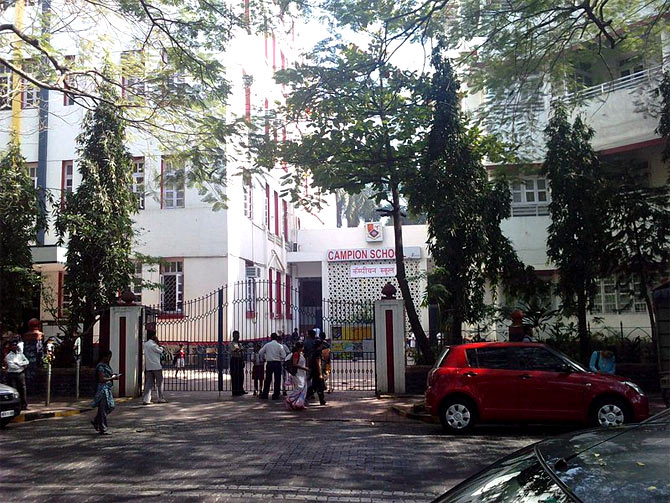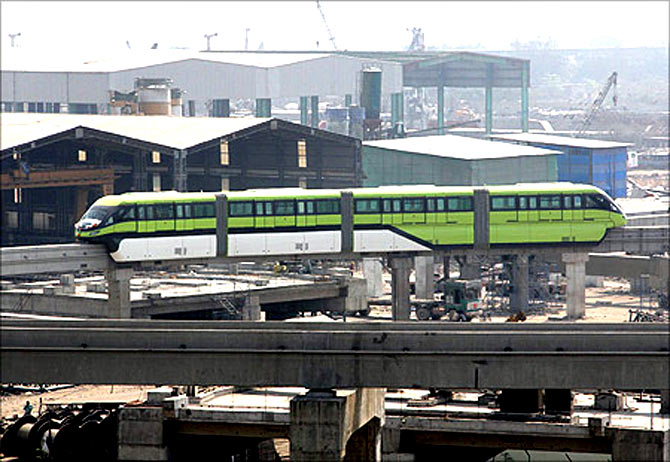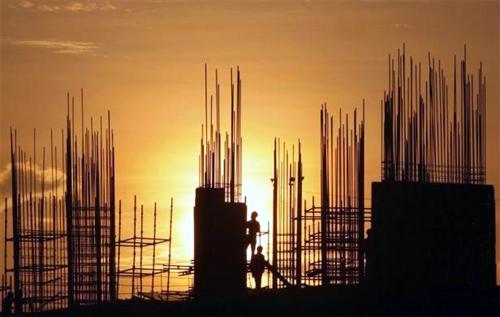Photographs: Courtesy, Four Seasons Private Residences Sumit Jain
Make a decision only after you have carefully studied these 10 points.
Most investors tend to get tangled in all sorts of questions when looking for a property to buy, which often adds to their anxiety and burden.
Buying a house for self is a very critical decision because it is a once in a lifetime decision involving a major chunk of one's life savings. On the other hand, as an investor, one needs to evaluate all the factors because the returns from the property will change the landscape of his/her financial conditions dramatically.
Here are some aspects you must take into consideration before buying a home:
1. Know your requirements
The first thing to do is to evaluate the size of your house based on your needs and lifestyle.
Standardised housing projects offer a definite set of options while tailor-made houses help in setting the size as per your choice. If you are an end-user, then you will have to consider factors such as space required for your family today and in future.
You may also need to understand if you are ready to wait for your 'dream home'. If yes then what could your waiting period be.
In case, you are an investor, then you should be clear as to which size and type of property is absorbed quickly in the chosen micro-market, the time horizon for holding your investment and last but not the least identify the target group you are aiming to sell the property to in future.
The author is co-founder and CEO, CommonFloor.com.
10 things every homebuyer should know
Photographs: Wikimedia commons
2. Choose an ideal location for yourself
Every person would have his/her own set of preferences while deciding the location for residence. It usually depends on how far you will have to commute regularly (to work/school) and how far is it from places you or your family members would visit frequently (city centre, nearby market).
Other two key aspects to be considered while making a decision on location are connectivity and public transport facility that the locality offers. You should find out what are the probable modes of transport that you and your family would rely on and whether these facilities are present in the project's location.
Investors have to identify how the property market has performed in recent times, if there are similar properties available in the same locality, and if so, then what rents are these properties fetching.
10 things every homebuyer should know
Photographs: Sahil Salvi
3. Look outside the envelope
A bird's-eye view on the availability of essential factors describing the liveability of a locality including schools, grocery stores, health care facilities, parks, etc. is important.
Liveability is a combination of efforts put in by the local authority as well as market forces.
For instance, clean roads, well-maintained sewage network, less water logging issues signify the management efficiency of the urban local bodies.
Whereas, presence of good shopping centers, nice eateries, etc. are a result of the prevailing market forces. It is a symbiotic relationship between the two, which cannot be ignored.
End-users have to analyse the current stage of the locality's development and find out the projected time for it to achieve full development with necessary amenities.
You will also have to decide if you are willing to reside in such a locality or wait until it is fully developed.
Investors should check whether the locality will develop within the period of your investment horizon. To estimate the development potential of the locality, look for very strong cues such as upcoming metro lines, monorail, flyovers, office complexes, shopping facilities, private hospitals, etc.
10 things every homebuyer should know
Photographs: Rediff Archives
4. Choose what is right for you from the lot
There may be multiple options available for investment at a single point of time. But you will have to look at various parameters, compare the available options and choose the best suitable property. While an under-construction property is available at a cheaper rate, a resale property might be expensive, since it already has all requisite clearances and is ready to be occupied.
At the same time, a very old property may be available at a very cheap rate, but it may require a huge investment for updating. If there is a wide range of property options available in a micro-market, it is possible that one can get a good housing unit at much cheaper rate. So make sure that you do enough research and do not hesitate to negotiate.
Properties are available at different stages in the market like: a) Ready to move in properties b) Under construction properties and c) Resale properties.
Buyers should look at amenities available in the project and possession time line if the property is under construction. Compare all aspects with other available options in the market.
Other important aspect is to think ahead of time. The property you buy today should come with updated amenities and specifications so that it can attract buyers even few years later.
10 things every homebuyer should know
Photographs: Reuters
5. Gauge the developer
One should do a proper market research on the reputation of the developer and his past completed projects, if any. This provides a better idea about the capability of the developer and the construction quality he would deliver. Beware of fly-by-night developers and do not get carried away by their dazzling presentations and jazzy brochures.
Go for a site visit and check out the project site carefully to avoid future complications. If you are buying an under construction property, try to check the financial capability of the developer, particularly new developers.
The credibility of the developer can be known by enquiring with brokers, going through the developer's website, knowing the awards and affiliations received by the developer, and browsing through various blogging websites. Apart from seeing all the above, investors should check the rental values fetched and the capitals gains received by the past projects of the developer.
10 things every homebuyer should know
6. Know your house before it is built
Check the specifications and the quality of the property. Sometimes, the standard material specifications shown in the plan and brochure are replaced with cheaper materials in reality. Same goes with sanitary ware and plumbing too.
In the areas where electricity is a problem, the developers promise to provide 100 per cent power back-up which does not convert into reality.
Approvals by the concerned government and local authorities must be checked. In some cases, sample houses may prove to be misleading as they are created on a plot away from the actual construction.
The sample units may differ in size /dimensions and furniture design and placement might be done in a way so as to make it look spacious. It is advisable to double check the dimensions of the plan given in the brochure vis-a-vis the sample unit built.
While checking the area of a unit, it is important to have a clear idea about the carpet area, built-up area and super built-up area. The carpet area is the private space inside the house that is available to use (where carpet can be laid).
Built-up area is the total space including wall areas (Usable Private + Non-usable Private).
Super built-up area is a combination of all the area available (Usable Private + Usable Common + Non Usable Private).
End-users often get tricked by developers with regard to built-up area versus super built-up area versus carpet area. Find the real truth: know how much area you are getting exactly.
Ask for sample boards for finishing materials and for plumbing/electrical materials being used in the project.
The properties that are garden-facing, pool-facing or offer a good view are usually considered better than other properties from the same lot. They are also charged slightly higher than the other units.
Checking the quality of property is important for investors too as selling a low-quality unit in future would be complicated. Make sure that the property design lies within the tolerance of the local culture and norms.
For example, in some Southern India markets, buyers prefer houses with vastu-compliance; anything otherwise is not at all accepted.
10 things every homebuyer should know
Photographs: Dominic Xavier/Rediff.com
7. Inclusive of all charges!
Charges quoted for amenities and facilities vary from developer to developer. These charges include External Development Charges, Internal Development Charges, parking charges, one-time club-membership charge, security deposit, water charges, etc. Out of these, the charges levied by the local authorities can be easily checked with them.
For example, one can find out what is the EDC rate charged by the local body in a particular locality and if it is the same for other projects in the same locality. The parking charges can be compared with what other developers are charging.
One time maintenance is again the most important component of the total house cost. One should ask the developer as to how this money will used, maintained and transferred in the future to the maintenance body.
Buyers can ask the developer for a clear breakup of all the charges and also for the details of all additional charges like stamp duty, registration charges, etc.
Be informed about the timeline for paying these charges. Investors should also possess a clear idea of all the charges and know what one-time charges and annual charges are.
Check for transfer fees for transfer certificates which can be levied in case you want to sell the property to another party.
10 things every homebuyer should know
Photographs: Uttam Ghosh/Rediff.com
8. Bank requirements
The loans given by banks generally do not exceed 80 per cent to 90 per cent of the cost of the house.
It is always good to go with a property which is pre-approved by reputed banks. As an end-user, you should be aware of the amount of loan you are eligible to get for the property.
Necessary documents required to obtain a loan should be gathered simultaneously. It is also important to work out other source of finance for the amount other than loan.
For an investor, the most critical part would be to calculate tax benefits in case of home loan. Time period of money being locked for is as important to consider besides tax implications on second home.
10 things every homebuyer should know
Photographs: Danish Siddiqui/Reuters
9. Buying an old property?
Buying a property in the secondary market involves a lot of checks such as mortgage on the property, previous dues with the association, etc. Sometimes, it may so happen that the property is in dispute. And for such properties, one should hire a good property lawyer.
In resale transactions, it is always good to seek a title clearance certificate.
Mother Deed is a must. A 'mother deed' contains the chain of titles of the relevant house/apartment/flat and of the land on which it has been constructed. It traces the original ownership of the property and all subsequent transfers which must be seamless and uninterrupted.
Other relevant documents to be acquired in such transactions are: Tax paid receipts, non-encumbrance certificate, sanctioned plans, approvals and clearance certificates and occupancy certificate.
You have to find out the reason of selling the property. And importantly, before signing any document, check with your bank as to how much loan can be approved for the selected property because many banks do their own property valuation before disbursing the loan which may differ from the market value.
Check on the amount of cash required by the seller to complete the deal vis a vis your own portfolio.
10 things every homebuyer should know
Photographs: Rediff Archives
10. Legal aspects of property buying
It is the most important part of a property transaction. Before proceeding for sale agreement, one has to be aware of certain issues such as clear and transferable title, record of right and title, encumbrance charge etc. for the property.
One should also make sure that the property is not under any kind of requisition or acquisition. The property should have all the statutory approvals and power of attorney should be obtained from the seller.
The sale agreement has to be registered on a stamp paper as described by the government. As a buyer of the property, one should check for registration charges applicable as per the current state to get the property registered on government approved stamp paper.
No objection certificate in case of pre-owned property and membership document and no due certificate in case of co-operative society should also be obtained.
The investors in particular must also check whether the existing association has any restrains for issues like renting to bachelors, using the property as serviced apartment or guest house etc. Probational NOC is a must to obtain for investors.












Comment
article